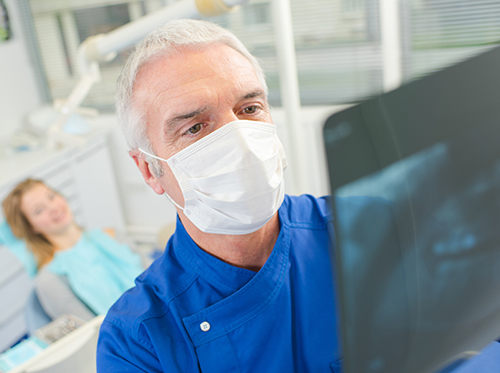October 14th, 2020

X-rays have been a function of dental healthcare for a long time. That in and of itself should be good news, because it means we've had plenty of time to improve them. While there is always some risk in exposure to radiation, dental X-ray exposure has decreased significantly due to all the advances in technology. So there’s risk, but X-rays are quite safe.
Think of X-rays as you would about a car. Automobiles these days have all kinds of technology to make them as safe as possible. There's still a chance that you’ll suffer an accident. Would you stop using a car because of that risk? When it comes to dental X-rays, Dr. Hudis and our team believe the positives clearly outweigh the negatives.
X-rays can be done digitally or with film. For film, X-rays require different exposures at different speeds to produce the image. Digital X-rays have software that automatically adjusts the exposure and produces the X-ray in a digital file. Since they substantially reduce your exposure to radiation, digital X-rays are the current standard in dental offices.
In addition to digital X-rays, lead aprons are an essential piece of X-ray safety. They help protect internal organs from X-rays by acting as a shield. They usually come with a thyroid collar as well, since that is one of the most vulnerable areas to X-rays in the body. Lead aprons can absorb up to 95% of any scatter rays that result from an X-ray. Not bad, right?
Although dental X-rays involve some radiation exposure (not all of it can be eliminated), so does everyday life. Getting too much sun, for example, can be dangerous. The truth is, we accumulate radiation in our bodies over a lifetime, so it’s worthwhile to be aware and avoid as much unnecessary exposure as possible. When it comes to your dental health, though, getting an X-ray — especially when your doctor says you need it — offers more benefits than risks.
Ask us about the type of dental X-rays we use during your next visit to our Princeton, NJ office!
October 7th, 2020

Adults are no strangers to feeling like there is never enough time in the day to get everything done. Your alarm clock rings and within minutes you ping pong around trying to spread peanut butter on sandwiches, answer your cell phone, remove the dog hair from your clothes, and make sure your child has completed his or her science fair project. Brushing your teeth can easily fall to the wayside. That is why our office promotes a simple, daily oral health regimen that you can easily incorporate into your busy lifestyle.
The American Dental Hygienists' Association (ADHA), in partnership with the Wrigley Jr. Company, is celebrating National Dental Hygiene Month (NDHM) during October. The ADHA encourages people to "Brush. Floss. Rinse. Chew...Keep it Clean, Keep it Healthy!" and offers some great tips for a quick and effective home oral health routine, below:
Oral Health Routine at Home
- Brushing your teeth twice daily is the most important thing you can do to diminish the accumulation of plaque and the potential for other oral problems such as cavities and gingivitis.
- Flossing once daily removes plaque and food from beneath the gums and between teeth that brushing alone cannot remove. Tooth decay and gum disease often begin in these areas.
- Rinsing your mouth with an antibacterial, non-alcohol based mouthwash kills plaque and gingivitis germs that brushing and flossing do not catch. We recommend using a mouthwash with the ADA Seal of Acceptance.
- Chewing sugar-free gum helps produce saliva, which battles cavities. The gum also neutralizes plaque, strengthens enamel, and removes remaining food. It is especially important to chew gum after eating or drinking.
It's easy to put the toothbrush down in order to take care of matters you feel are more urgent, but remember, a good oral health routine at home is the best way to prevent periodontal disease. "Periodontal disease is the most common cause of tooth loss in adults. An estimated 75 percent of Americans reportedly have some form of periodontal disease," said the ADHA. Periodontal disease also is linked to more serious illnesses such as diabetes and stroke.
Also, remember to keep regular visits with our office. Dr. Hudis can help you learn more about proper care for your teeth and gums.
September 30th, 2020

It's easy to be skeptical about X-rays whether we speak of a full-body X-ray or a dental X-ray. Radiation is radiation. It's vital to know all the facts before judging too harshly, though. Dental X-rays can be one of the best preventive tools for your dental health. We offer various treatments at Princeton Restorative & Implant Dentistry, but helping you become better informed is one of the best ways to decide what will be best for you.
According to the AmericanDental Association, healthy adults typically receive routine dental X-rays every two to three years. The timeline for children is every one or two years, and one and a half for teens. Children and teens require more X-rays than adults because their teeth are still developing, which makes them more susceptible to cavities.
In general, Dr. Hudis will determine how often dental X-rays need to be taken for each individual patient, taking into consideration physical symptoms, clinical findings, and risk for infection. Most dental professionals use Caries Management by Risk Assessment (CAMBRA) to help them determine how often X-rays should be taken, so you can rest assured that we are making an informed decision.
In addition to that, it should be reassuring to know that these days, most dental X-rays are digital, which significantly reduces your exposure to radiation. In fact, you’re likely to pick up more radiation just from being in the sun! Lead aprons and thyroid collars are also tools that Dr. Hudis and our team use to keep X-ray exposure to a minimum.
At our office, we believe that diagnosing cavities and other potentially harmful conditions by dental X-ray does you more good than harm. If you have any questions about our X-rays, feel free to give our Princeton, NJ office a call or bring up the subject during your next appointment!
September 23rd, 2020

While there is no definite evidence that if your prevent gum diseases, like periodontitis, that you may be able to prevent a heart condition or heart disease. The only thing experts, like Dr. Hudis, know for sure is that if you take care of your gums it can lessen atherosclerosis, (build-up of artery clogging plaque) that may result in a heart attack or stroke.
Could periodontal disease cause heart attacks?
Regardless of your oral health, if you're at a high risk for heart disease, you need to take action.
- Maintain a healthy weight or lose weight.
- Consume healthy foods and beverages.
- Exercise several days the week. Walking is a powerful and lightweight exercise and will clear your head while helping your body get or stay healthy.
- Control any medical conditions you may have such as high cholesterol, diabetes, or high blood pressure.
- Reduce your stress. Have lunch with a friend, go for a walk in the park, take a bubble bath, mediate, or do whatever you find relaxing.
- Get a social life. Laughing reduces stress and “feel good” hormones. Everyone needs to feel like they are a part of something: join a book club or any activity where you can interact with other people at least once or twice a week
- Be sure to get enough sleep. The recommended amount is eight to nine hours a night. It has been proven that a lack of sleep increases your risk for angina, strokes, and heart attacks.
- Practice good oral hygiene to keep bacteria in check and your mouth healthy.
Contact our Princeton, NJ office if you have questions about your heart and oral health. If you take practice good oral hygiene, both your mouth and your heart will thank you.








